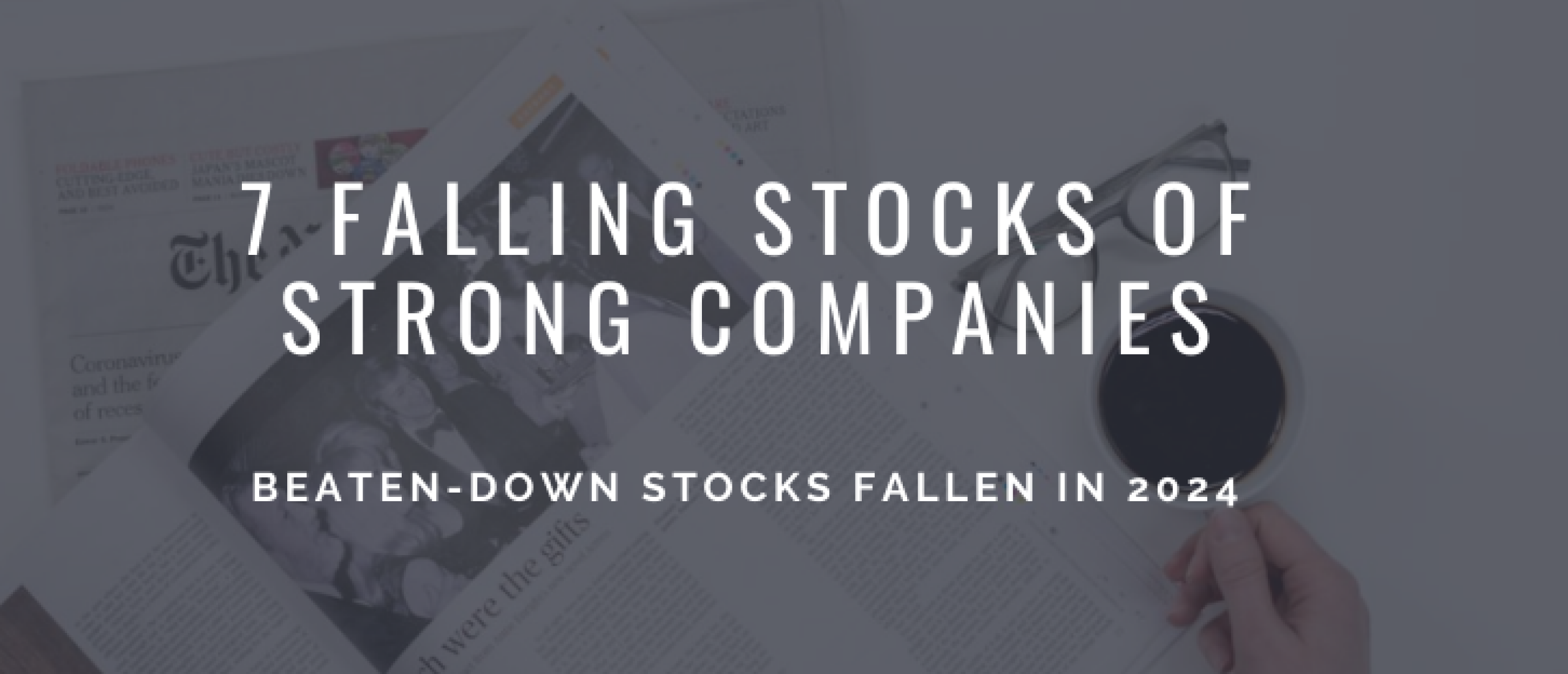In today's episode, we delve into the fascinating world of stock market dynamics, focusing particularly on seven stocks that have recently experienced significant downturns. The journey through these stocks isn't just about observing their current state but understanding the intricate factors that have led to their fallen status. As we navigate through this analysis, it's crucial to remember that investing in stocks requires a nuanced approach, especially when dealing with those that are currently underperforming.
How to invest in fallen stocks
First, let's talk about the allure and potential pitfalls of investing in fallen stocks. The concept of buying low and selling high is appealing to many investors, but it comes with its set of challenges. One common mistake is purchasing stocks too early in their decline, anticipating a quick rebound that may not materialize. This can lead to prolonged periods of stagnant investment or, worse, further losses. Therefore, a strategic approach, incorporating both technical analysis and a deep understanding of a stock's intrinsic value, is essential for timing your investment correctly.
Fallen stock 1. BMY
Fallen stock Bristol-Myers Squibb emerges as a compelling case study in this context. This pharmaceutical giant has seen its stock price take a significant hit from its all-time high. At first glance, the drop might signal a buying opportunity, especially for dividend investors. The stock's dividend yield, coupled with a historical pattern of dividend growth, makes it an attractive proposition. However, a closer examination reveals a mixed bag of signals. While the company's valuation metrics might appear favorable, with a forward price-to-earnings ratio indicating potential undervaluation, the stock's momentum and growth prospects are less encouraging.
Analyzing the stock through various lenses, including industry and sector rankings, as well as short-term EPS revisions, suggests a cautious approach. The potential for long-term value exists, but it hinges on the company's ability to navigate its current challenges, including a competitive pharmaceutical landscape and the need to bolster its drug pipeline for future growth.
Bristol-Myers Squibb, a pharmaceutical titan, presents an interesting case with its significant drop from all-time highs, drawing the attention of dividend-focused investors due to its appealing yield and consistent history of dividend growth over 34 years. The company's valuation at a glance seems attractive with a low price-to-earnings ratio, suggesting a potential undervaluation. However, the stock's performance is marred by weak momentum and a challenging growth outlook, particularly in the fiercely competitive pharmaceutical industry where innovation and pipeline strength are paramount. The mixed signals from various analytical perspectives, including industry and sector rankings and short-term EPS revisions, underscore the complexity of assessing its true investment potential.
Fallen stock 2. PFE
Turning our attention to fallen stock Pfizer, another pharmaceutical behemoth, we encounter a different set of circumstances. Pfizer's stock has also faced downward pressure, but the reasons and implications differ from Bristol-Myers Squibb. The end of the COVID-19 pandemic crisis has led to an evaluation of the company's stock, with investors closely watching its profitability metrics and growth prospects. Like Bristol-Myers Squibb, Pfizer's investment appeal must be weighed against its ability to innovate and maintain a robust pipeline of drugs.
Pfizer, another pharmaceutical giant, has experienced a downturn as the immediate crisis of COVID-19 wanes, prompting investors to reassess its valuation. Despite a strong profitability profile, Pfizer's growth and momentum indicators suggest caution. The stock's future performance hinges on the company's ability to sustain its pipeline of drugs and navigate the post-pandemic market dynamics. The comparison between Pfizer and Bristol-Myers Squibb highlights the nuanced considerations required in evaluating pharmaceutical stocks, where fundamental company strengths must be weighed against industry-specific challenges and growth prospects.
Fallen Stock 3. LVMH
As we explore other stocks, such as LVMH and International Flavors & Fragrances, the theme of cautious optimism in the face of market turbulence continues. LVMH, with its strong brand portfolio and global presence, presents a case where the stock's decline might be seen as a temporary setback, offering a potential buying opportunity for those with a long-term perspective.
Exploring the luxury goods sector, LVMH stands out as a high-quality company whose stock has faced a decline. The company's robust brand portfolio and strong profitability metrics, including an impressive return on equity, suggest a resilient business model. However, the stock's valuation requires careful consideration of future growth prospects and the luxury market's sensitivity to economic cycles. The analysis of LVMH's financial health, including cash flow dynamics and capital expenditure, is critical in assessing its potential for a rebound and long-term value creation.
Fallen stock 4. IFF
Fallen stock International Flavors & Fragrances, facing challenges in its mature market position, requires a more discerning approach, emphasizing the importance of understanding a company's fundamental strengths and market position.
International Flavors & Fragrances (IFF) represents a different scenario, operating in a mature industry phase and facing a significant downturn. The stock's valuation metrics, such as the high price-to-sales and price-to-book ratios, paint a picture of a company at a crossroads, with dividend yield offering some appeal to income-focused investors. The key to IFF's investment case lies in understanding the strategic initiatives underway to spur future growth, including innovations in flavor and fragrance development and potential market expansions.
Fallen stock 5. ALB
Albemarle, linked to the cyclical lithium market, underscores the volatility associated with commodity-based stocks. The stock's decline reflects the broader market uncertainties impacting the lithium sector, with technical analysis suggesting a cautious approach to entry. The company's future depends on the lithium market's dynamics and Albemarle's ability to capitalize on the growing demand for electric vehicles and energy storage solutions. The assessment of Albemarle's long-term prospects requires a deep dive into the lithium market's supply and demand factors, as well as the company's operational efficiencies and growth strategies.
The case of fallen stock Albemarle highlights the volatile nature of cyclical stocks, particularly those tied to commodity markets like lithium. The stock's performance is a reminder of the high-risk, high-reward nature of investing in such companies, where timing and market insight are crucial for success.
Fallen stock 6. BABA
In the realm of technology and e-commerce, Alibaba's story is particularly intriguing. The stock's significant drop, amidst regulatory pressures and market uncertainties, poses a dilemma for investors. The allure of Alibaba's underlying business strength and its potential for future growth must be balanced against the risks associated with regulatory challenges and the broader geopolitical landscape.
Alibaba's situation exemplifies the complexities of investing in Chinese stocks, with regulatory pressures and geopolitical tensions casting a shadow over its investment appeal. Despite its strong business fundamentals and significant market presence, Alibaba's stock has been battered by factors beyond traditional financial metrics, highlighting the importance of understanding the regulatory environment and political landscape when investing in such markets.
Fallen stock 7. YUMC
Fallen stock Yum China Holdings represents an intriguing case among the fallen stocks, showcasing the complexities of investing in companies operating within the volatile Chinese market. As a significant player in the fast-food industry, Yum China operates under the umbrella of Yum! Brands, boasting a strong portfolio that includes well-known names like KFC and Pizza Hut among its assets in China. Despite its solid brand presence and a strategy focused on expansion and leveraging its strong brand equity, Yum China's stock has encountered a notable decline.
The decline in Yum China's stock price can be attributed to several factors, not least of which is the broader context of economic and regulatory challenges facing companies in China. This downturn is particularly poignant given the company's efforts to expand its store footprint and innovate its menu offerings to cater to the evolving tastes of Chinese consumers. Despite these efforts, investor sentiment has been tempered by the overarching uncertainties in the Chinese regulatory environment and the potential impacts on businesses operating within the country.
Yum China's situation is compounded by the operational challenges it faces, including navigating the post-pandemic recovery phase and addressing competition in a highly competitive market. These factors necessitate a careful analysis of the company's ability to sustain growth and profitability in the face of these headwinds.
The investment analysis of fallen stock Yum China must, therefore, consider both the micro and macroeconomic variables affecting its business. On one hand, the company's strong brand portfolio, ongoing store expansion, and operational initiatives suggest a potential for growth and resilience. On the other hand, the external pressures from regulatory uncertainties and the broader economic environment in China pose risks that could impact its future performance.
Investors looking at Yum China as a potential investment opportunity are faced with weighing these competing factors. The stock's decline may present a buying opportunity if one believes in the company's long-term growth prospects and its ability to navigate the challenges inherent in the Chinese market. However, this requires a belief in the company's strategic direction and a thorough understanding of the risks involved, particularly those related to regulatory and geopolitical tensions.
In summary, Yum China's stock reflects the broader challenges and opportunities of investing in China. While the company has strong fundamentals and a clear growth strategy, its performance and stock valuation are significantly influenced by external factors beyond its control. This underscores the importance of a nuanced approach to investing in Chinese stocks, where understanding the broader economic and political landscape is just as critical as analyzing the company's financial health and market strategy.
In conclusion, the journey through these seven fallen stocks offers valuable lessons for investors. The allure of buying into weakness can be tempting, but it requires a disciplined approach that considers not just the stock's current price but its underlying fundamentals, market position, and the broader economic and regulatory environment. As we continue to explore the stock market's ever-changing landscape, the importance of research, patience, and strategic thinking cannot be overstressed.






![5x Fallen Stocks with Potential [2022] Large Price Declines](https://media-01.imu.nl/storage/thehappyinvestors.com/4861/fallen-stocks-2560x1100.png)
